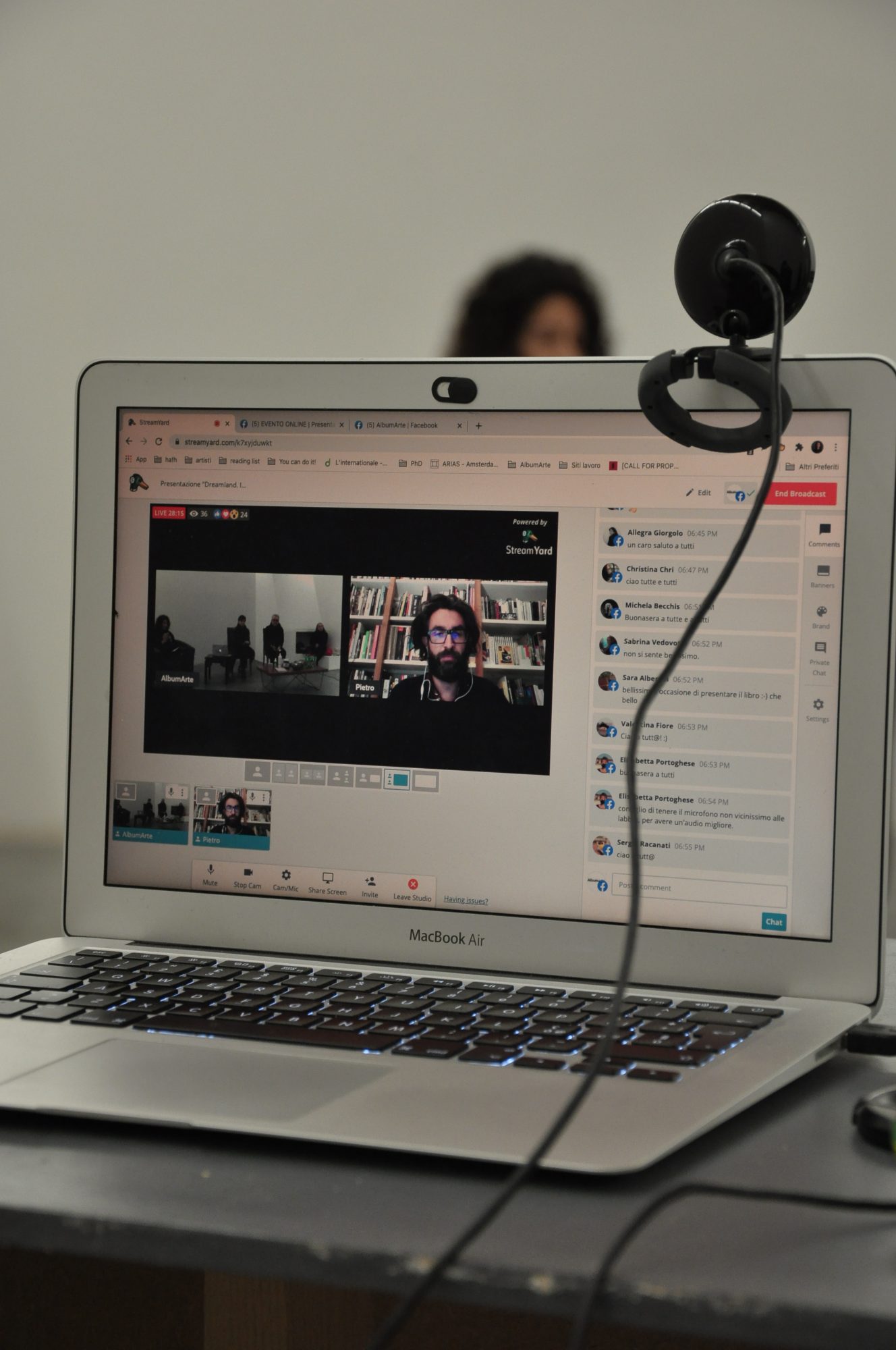AlbumArte presents
Dreamland. I confini dell’immaginario.
Le migrazioni nell’arte contemporanea
by Rosa Jijón e Francesco Martone
first publication by the collective A4C-Arts For The Commons
presentation and debate by Daniela Trincia
Together with Pietro Gaglianò and the authors, Rosa Jijón and Francesco Martone
with the participation of the artist Estefanía Peñafiel Loaiza
13 January 2021 at 6.30 pm
Live on AlbumArte Facebook page
On wednesday 13 January 2021, AlbumArte, closed since 5 November 2020 due to the measures put in order by Prime Minister’s Decree, presents the first publication by the collective A4C-Arts For The Commons, entitled Dreamland. I confini dell’immaginario. Le migrazioni nell’arte contemporanea by Rosa Jijón and Francesco Martone (Manifestolibri, 2020) live on AlbumArte Facebook page.
During this second moment of imposed silence, we did not want to do anything online, considering important that contemporary art is lived in presence, but this publication seemed to us a special occasion, because it is the first editorial work of A4C-Artsforthecommons, founded in 2016, which the Ecuadorian artist Rosa Jijón and the ecological and human rights activist Francesco Martone, who have collaborated several times with AlbumArte, curating exhibitions and debates, and which will bring them in a few days to move for a long period in Ecuador and other areas of Central and South America.
A4C-Artforthecommons is a collective work aimed at providing a common working platform between artists and activists interested in the synergies between visual production and initiatives for the recovery and management of the “commons”, and to address issues relating to human migration, borders, social and environmental justice, “liquid” citizenship. By creating opportunities for exchange, collective action and sharing, A4C intends not only to provide a platform but also to contribute to building a new “commons”, a synthesis between art and political commitment.
The volume that we will present through the debate, reflects precisely on the relationship between art and activism with a selection of works by contemporary artists who have tried their hand with the theme of migration, the frontier, citizenship, to offer conceptual and visual tools wherewith reading the border as a place for the production of meaning, the creation of “commons”, the claim of self-determination and rights. The border thus becomes a “constituent” space of trans-sovereignty and territories, regardless of the regimes arbitrarily traced in the course of history, immaterial, but it produces narratives which contain within themselves the potential of their own overcoming.
Rosa and Francesco in this book, try their hand at the migratory theme and its various visual and artistic representations, through works by contemporary artists from various countries, and a selection of critical essays Dreamland, I confine dell’immaginario (ManifestoLibri 2020) intends to offer a platform for exchange and dialogue between the world of contemporary art, and those who, in various capacities, from an academic or activist point of view today deal with migration. The intention is to get out of the usual framework that considers migrants as victims, object of study or pawns of exchange of geopolitics, to try to recover the dimension of agents who decide to undertake a migratory path, and in so doing challenge the borders. sovereigns of states, transforming the places they cross from time to time. And in so doing they contribute to the construction of new cultural, social and political practices. The book opens with an essay by TJ Demos, a chapter on migrations and visual arts taken from the catalog of the exhibition “La Terra Inquieta” at the Milan Triennale in turn taken from “The migrant image”, followed by essays by Ursula Biemann on his work on Sahara migration routes, and his work Sahara Chronicle, a paper by Lorenzo Pezzani and Charles Heller of Forensic Oceanography, on “dissident cartography” and their work “A left-to-die boat” also presented at the Venice Biennale, and a written contribution by Nation25, a collective of Italian artists who, again in Venice, proposed the Nationless Pavillion, a pavilion for peoples without a nation. An intertwining therefore between theoretical elaboration and artistic practice, which also unfolds in the other works chosen for Dreamland, readings that weave a decolonial vision of the migration issue with a multiplicity of means and devices, from photography, to video, to documentation, to the register, to the rendering, to the performance, but also to the reconstruction as if it were a forensic medicine of events and geographies, which underlie co-responsibility and violations of rights. Margherita Moscardini, Ursula Biemann, Jota Castro, Elena Mazzi and Enrica Camporesi, Estefanía Peñafiel Loaiza, Kader Attia, Nation25, Forensic Oceanogrpahy, and Oliver Ressler, with their works demonstrate that art in addition to being representation, also becomes proof, evidence, an instrument of denunciation and claim. The plurality of the questions and solutions offered by the artists represents in itself the urgency of a plural, transversal, intersectional look at the great global issues, whether it is migration in this case, or for example the climatic and ecological emergency, often intimately connected to human mobility. The book also contains a work by A4C-Artsforthecommons, which investigates the transformations generated by the temporary occupation of urban spaces by migrant and Roma communities in Rome.
PRESS RELEASE >>>
INVITATION >>>
